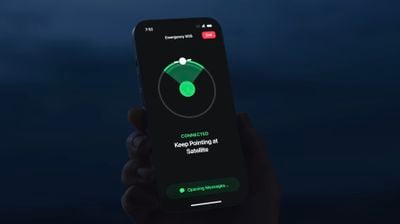Apple Expands Emergency SOS via Satellite to UK, France, Germany, and Ireland
Apple today announced the expansion of Emergency SOS via Satellite and Find My via satellite functionality to the United Kingdom, France, Germany, and Ireland.

iPhone 14 users can now connect with emergency services when cellular and Wi-Fi coverage are not available, and calls from the Emergency SOS via Satellite feature will be routed to local emergency services facilities.
Apple's Emergency SOS via Satellite feature is available to all iPhone 14 users running iOS 16.1 in supported countries and it is free to use for two years. It is designed to allow iPhone users to make emergency calls using satellite connectivity outdoors when no cellular or WiFi connection is available.
Apple says that with the release of iOS 16.2, expected later today, users who dial a local emergency service number will automatically be routed to 112, the European emergency phone number, if the call does not go through due to a cellular or Wi-Fi connection not being available, enabling them to utilize Emergency SOS via satellite even if they don't dial 112.
"Emergency SOS via satellite makes emergency communications over satellite more accessible, which is very exciting,” said Gary Machado, the European Emergency Number Association's CEO. "In practice, it means that many more people will be able to contact 112 when they have no mobile coverage and need urgent assistance. We are confident that this will save many lives and offer significant help to emergency services dealing with these often very complicated rescues."
"Being able to use a satellite connection to contact 999 or 112 if there is no cellular or Wi-Fi coverage is a breakthrough that Apple has brought to the general public with iPhone 14," said John Anthony, the British Association of Public Safety Communications Officials' president. "The feature will mean that emergency services can be alerted when it was not previously possible and are then able to do their jobs to better effect, in part because of the initial information that can be shared with dispatchers, such as location and essential details about the emergency. Ultimately, this will help save lives."
Emergency SOS via Satellite launched in the United States and Canada last month, and at the time, Apple said that it would expand to France, Germany, Ireland, and the UK in December. Support for more countries will follow next year, according to Apple.
Satellite connectivity can also be used to update a Find My location without WiFi or cellular connectivity through the Find My app.
Popular Stories
Apple will launch its new iPhone 17 series in two months, and the iPhone 17 Pro models are expected to get a new design for the rear casing and the camera area. But more significant changes to the lineup are not expected until next year, when the iPhone 18 models arrive.
If you're thinking of trading in your iPhone for this year's latest, consider the following features rumored to be coming...
In select U.S. states, residents can add their driver's license or state ID to the Wallet app on the iPhone and Apple Watch, providing a convenient and contactless way to display proof of identity or age at select airports and businesses, and in select apps.
Unfortunately, this feature continues to roll out very slowly since it was announced in 2021, with only nine U.S. states, Puerto Rico,...
Since the iPhone X in 2017, all of Apple's highest-end iPhone models have featured either stainless steel or titanium frames, but it has now been rumored that this design decision will be coming to an end with the iPhone 17 Pro models later this year.
In a post on Chinese social media platform Weibo today, the account Instant Digital said that the iPhone 17 Pro models will have an aluminum...
Three out of four iPhone 17 models will feature more RAM than the equivalent iPhone 16 models, according to a new leak that aligns with previous rumors.
The all-new iPhone 17 Air, the iPhone 17 Pro, and the iPhone 17 Pro Max will each be equipped with 12GB of RAM, according to Fixed Focus Digital, an account with more than two million followers on Chinese social media platform Weibo. The...
Apple is expanding the ability to add an Apple Account Card to the Wallet app to more countries, according to backend Apple Pay changes.
With iOS 15.5, Apple updated the Wallet app to allow users to add an Apple Account Card, which displays the Apple credit balance associated with an Apple ID.
If you receive an Apple gift card, for example, it is added to an Apple Account that is also...
Apple does not plan to refresh any Macs with updated M5 chips in 2025, according to Bloomberg's Mark Gurman. Updated MacBook Air and MacBook Pro models are now planned for the first half of 2026.
Gurman previously said that Apple would debut the M5 MacBook Pro models in late 2025, but his newest report suggests that Apple is "considering" pushing them back to 2026. Apple is now said to be...
Apple is continuing to refine and update iOS 26, and beta three features smaller changes than we saw in beta 2, plus further tweaks to the Liquid Glass design. Apple is gearing up for the next phase of beta testing, and the company has promised that a public beta is set to come out in July.
Transparency
In some apps like Apple Music, Podcasts, and the App Store, Apple has toned down the...
If you pay for iCloud storage on your iPhone, did you know that Apple offers you five perks beyond the extra storage space, at no additional cost?
Here are the perks included with all iCloud+ plans:Private Relay keeps your Safari browsing history entirely private from network providers, websites, and even Apple.
Hide My Email generates unique, random email addresses whenever needed.
Hom...




















